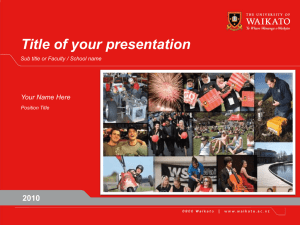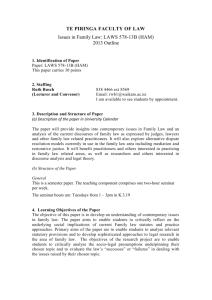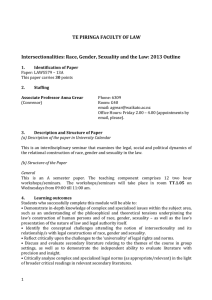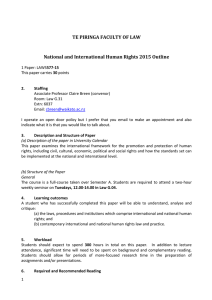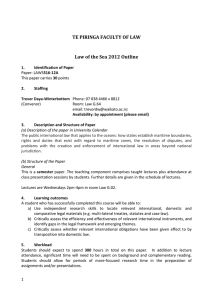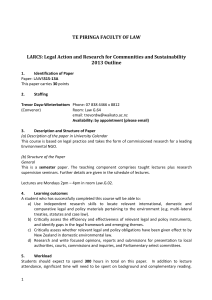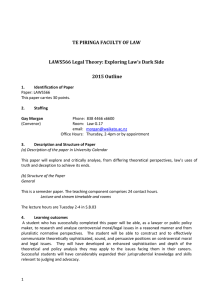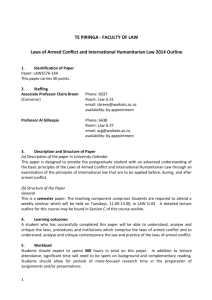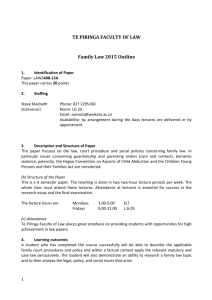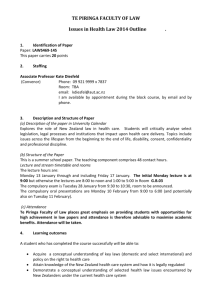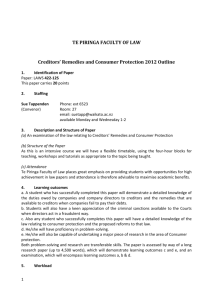LAWS570-14A Comparative Environmental Law and Policy
advertisement
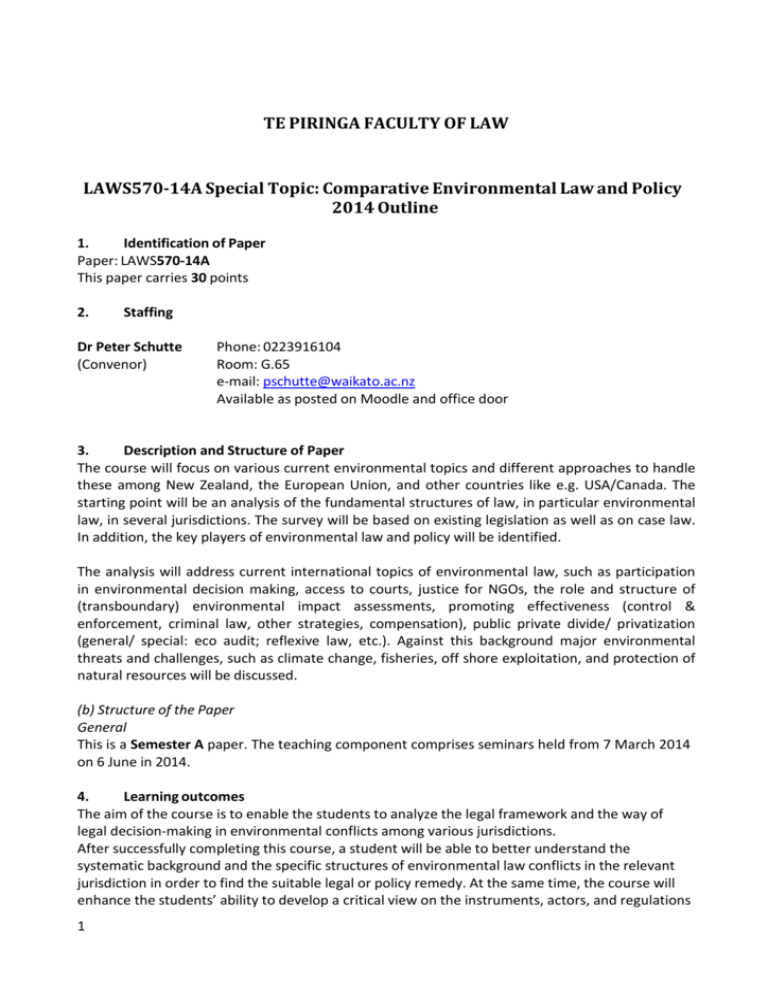
TE PIRINGA FACULTY OF LAW LAWS570-14A Special Topic: Comparative Environmental Law and Policy 2014 Outline 1. Identification of Paper Paper: LAWS570‐14A This paper carries 30 points 2. Staffing Dr Peter Schutte (Convenor) Phone: 0223916104 Room: G.65 e‐mail: pschutte@waikato.ac.nz Available as posted on Moodle and office door 3. Description and Structure of Paper The course will focus on various current environmental topics and different approaches to handle these among New Zealand, the European Union, and other countries like e.g. USA/Canada. The starting point will be an analysis of the fundamental structures of law, in particular environmental law, in several jurisdictions. The survey will be based on existing legislation as well as on case law. In addition, the key players of environmental law and policy will be identified. The analysis will address current international topics of environmental law, such as participation in environmental decision making, access to courts, justice for NGOs, the role and structure of (transboundary) environmental impact assessments, promoting effectiveness (control & enforcement, criminal law, other strategies, compensation), public private divide/ privatization (general/ special: eco audit; reflexive law, etc.). Against this background major environmental threats and challenges, such as climate change, fisheries, off shore exploitation, and protection of natural resources will be discussed. (b) Structure of the Paper General This is a Semester A paper. The teaching component comprises seminars held from 7 March 2014 on 6 June in 2014. 4. Learning outcomes The aim of the course is to enable the students to analyze the legal framework and the way of legal decision‐making in environmental conflicts among various jurisdictions. After successfully completing this course, a student will be able to better understand the systematic background and the specific structures of environmental law conflicts in the relevant jurisdiction in order to find the suitable legal or policy remedy. At the same time, the course will enhance the students’ ability to develop a critical view on the instruments, actors, and regulations 1 within their professional practice. Consequently, the paper will help students to work e.g. on national as well as international conflicts, transactions, or large infrastructure projects, and on the development of future regulation proposals. 5. Workload Students should expect to spend 300 hours in total on this paper. In addition to lecture attendance, significant time will need to be spent on background and complementary reading. Students should allow for periods of more‐focused research time in the preparation of assignments and/or presentations. 6. Required and Recommended Reading Please refer to Lecture Schedule below. Required and recommended reading will be posted for each seminar on the Moodle (http://elearn.waikato.ac.nz), the University of Waikato’s online learning system. Any such material is provided on the following terms: University of Waikato owns the intellectual property rights, including copyright, in and to this site, or has acquired the necessary licenses to display the material on the site. As a student of the Te Piringa Faculty of Law, you are granted a limited license to use (access, display or print a single copy) the material from the papers in which you are enrolled for the purposes of participating in the paper only, provided the information is not modified. Materials may not under any circumstances be copied, stored, distributed or provided in any form or method whatsoever to any third party. Any other use of the material is prohibited. None of the material may be otherwise reproduced, reformatted, republished or re‐disseminated in any manner or form without the prior written consent of University of Waikato. To obtain such consent, please contact the Te Piringa Faculty of Law. 7. Online support Online support for this paper is provided via Moodle. 8. Assessment School procedures for the presentation of course work are set out in the Te Piringa Faculty of Law Graduate and Postgraduate Handbook which is available from: http://www.waikato.ac.nz/law/graduate. See also paragraph 12 below on referencing guidelines and plagiarism. An assignment template document including coversheet is available on the Law Student Homepage http://www.waikato.ac.nz/law/student In workshops throughout the course, the students are asked to prepare and present one brief summary of a reading assignment as well as one presentation on a specific topic or leading case. This analysis/ presentation can be used as basis for the third part of the students’ assessment being a final paper. The presentation is to be held orally within the workshop. It must have a length of 30 minutes. Students are asked to use supporting media, such as handouts, a power point presentation, etc., 2 if convenient to explain the issue. The topic must be defined with the Convenor at the beginning of Term 1. A draft structure and a list of required and recommended literature for the fellow students have to be presented to the convenor for review, discussion, and approval on or before March 31st. All presentations must start with a description of the underlying environmental problem or conflict before analyzing the legal framework. The presentations will be due on April 30th and to be held during the seminars in Term 2. The final paper must include a comparative analysis of a selected environmental law topic. It has to consist of 10.000 words (footnotes and bibliography excluded). The topic must be defined with the Convenor at the beginning of Term 2. A draft structure has to be presented to the convenor for review, discussion, and approval until May 16th. All papers must start with a description of the underlying environmental problem or conflict in its specific national (e.g. cultural/ historical/ social/ industrial/ environmental) setting before analyzing and comparing the relevant political, institutional and legal framework. The papers will be due on June 27th. b) Coursework: Final Examination Ratio: 100/0 c) Assessment Components Component In‐class‐work Presentation Final Paper Percentage of overall mark 10% 20% 70% Due date Term 1 April 30, 2014 June 27, 2014 d) Handing in, marking time and collection All assignments must be submitted electronically through Moodle (http://elearn.waikato.ac.nz), and include a coversheet. The coversheet template is provided on the Law Student Homepage (http://www.waikato.ac.nz/law/student). See Te Piringa - Faculty of Law Graduate and Postgraduate Handbook, available at www.waikato.ac.nz/law/graduate. Where practical, it is the policy of Te Piringa - Faculty of Law to return marked work to students within five weeks of submission. If you require assistance with Moodle, or encounter any problems, please contact the Help Desk. You can send a message to Help Desk by using the instant message service in your paper’s Moodle site (from the participants list within the People block). Alternatively, you can email them directly at help@waikato.ac.nz or call 838 4008. e) Measurement of Achievement Achievement in assignments and presentations will be measured in terms of levels of understanding and knowledge gained, in terms of the originality and the sophistication of analysis provided, in terms of coherent and logical structure, and in terms of the fluency and accuracy of expression and referencing. f) Management of assessment deadlines, process for requesting extensions and special consideration, and for appeals i) Extensions Students are required to complete and submit all internal assessment by specified dates. The 3 meeting of deadlines is a mark of professionalism and its enforcement is essential for fairness to 4 all students taking the paper. Handing in course work on or before the due in date also facilitates the timely return of marked work by academic staff. Students should meet requirements as to time deadlines for course work, or make a request for an extension or special consideration in appropriate circumstances (see Graduate Programmes Manual available from the Faculty of Law Graduate website http://www.waikato.ac.nz/law/graduate/.) Failure to comply with requirements as to the time deadlines for internal assessment without having successfully applied either for an extension or special consideration with supporting evidence before the due date will result in deduction of 2.5 marks for each day the work is late. Lateness of more than a week may result in the work not being marked. No deadlines may be extended beyond two weeks after the last teaching day of the semester(s) in which the paper is taught as final grades must go to the Board of Examiners at this time. Unless an extension in writing has been granted, a lecturer may refuse to accept a piece of work which is submitted after the specified date, and automatically award it no mark, or may lower the mark as a penalty for lateness. Applications for extension, on the form obtainable from the Resource Room, must be submitted to the Chief Examiner or nominee. Students should not submit the extension form to the lecturer, nor should students seek extensions from the lecturer via other forms of communication. Extensions will be granted only on evidence of illness, family bereavement, or serious personal accidents or circumstances. Please note that too many assignments due at the same time is NOT an acceptable reason, neither are claims that computers and/or printers have crashed. Account will be taken of the time in which the student has had to complete the internal assessment before the supervening event occurred. It will be important to consider if the grant of the extension will give the student in question an unfair advantage over other students. A maximum period of 21 days will be given as an extension unless there are exceptional circumstances. In determining applications the Chief Examiner or nominee may consult with the Convenor or lecturer of the relevant paper. When the Chief Examiner or nominee has made a decision on the application for extension, the Resource Room Administrative Assistant will advise the student of the decision by email. Following this, the extension form will be given to the relevant lecturer who will retain it until after the assignment is marked and returned to students. The form will then be placed on the student’s file. It should be noted that if an extension of longer than 14 days is granted, the assignment will not be automatically printed out and delivered to the lecturer, therefore the lecturer is responsible for ensuring the assignment is printed. In appropriate cases, when a student’s application for extension is declined the Chief Examiner or nominee will inform the student of the process for applying for special consideration. ii) Special Consideration The Assessment Regulations 2005 as set out in the University Calendar 2013 list in detail the university‐wide policies and procedures, which apply concerning missed examinations, impaired performance or impaired preparation time for an examination, and missed or impaired course work. Students are responsible for ensuring that they comply with these regulations. Application forms for special consideration for internal assessment are available from the Resource Room. iii) Appeals (University Calendar 2013, Assessment Regulations 2005, Reg. 24) A student may appeal against any decision taken under these regulations. 5 An appeal, comprising a written statement of the circumstances of the appeal, together with supporting evidence if available, must be submitted by the student in writing to the Director of Student & Academic Services not more than seven days after the date on which notification of the relevant decision is received. Appeals under this section are considered and decided by the Deputy Vice‐Chancellor by delegated authority of the Academic Programmes Committee. A decision by the Deputy Vice‐Chancellor is notified in writing, and is final. 9. University Calendar Regulations and Policies Your attention is drawn to the following regulations and policies, which are published in the University Calendar 2013. Assessment Regulations 2005 Student Discipline Regulations 2008 Computer Systems Regulations 2005 Policy on the Use of Māori for Assessment Student Research Regulations 2008 Ethical Conduct in Human Research and Related Activities Regulations 2008. 10. Links to other papers 11. Fees Refer to http://calendar.waikato.ac.nz/admission/tableoffeesandcharges.html. 12. (a) Referencing guidelines and caution against plagiarism Referencing must be in accordance with the New Zealand Law Style Guide. (b) All written work submitted for the purposes of assessment must be your own work. Copying or paraphrasing all or part of another person’s work, be it published or unpublished, without clear attribution, is plagiarism. Plagiarism is misconduct and is dealt with under the disciplinary procedures of the University as outlined in the Student Discipline Regulations 2008 in the University Calendar. “Plagiarism means presenting as one’s own work the work of another, and includes the copying or paraphrasing of another person’s work in an assessment item without acknowledging it as the other person’s work through full and accurate referencing; it applies to assessment presented through a written, spoken, electronic, broadcasting, visual, performance or other medium.” See section 3, Assessment Regulations (2013 Calendar) Unless approved otherwise by the examiners of the papers concerned, a student must not submit as assessment material that is substantially the same as material submitted as assessment for a different paper. (c) 6 The Te Piringa Faculty of Law’s policy regarding plagiarism is contained in the Te Piringa Faculty of Law Graduate and Post‐Graduate Handbook and the Te Piringa Faculty of Law Graduate Programmes Manual, available from http://www.waikato.ac.nz/law/graduate/. 13. Health and safety A new Law School’s Health and Safety representative is currently to be arranged. 14. Class representation At the commencement of the semester / intensive paper, a class representative will be elected by the students in Comparative Environmental Law and Policy. This representative is encouraged to communicate regularly with the Convenor. Students in this paper are encouraged to liaise with their representative to discuss issues of concern. Contact details for the Student Representation Coordinator, Academic Services Division, are as follows: Samantha Whittle, Student Services, ext. 6264, CHSSG.25 email: student.reps@waikato.ac.nz 15. Complaints procedures The brochure Student Concerns and Complaints Policy provides details of the University’s process for handling concerns and complaints and is available from Faculty and School Offices, The Gateway and Student Services Division and is contained in the Calendar 2013. See also the document Student Support Structure at Te Piringa Faculty of Law, available from the Resource Room. 7 Lecture Schedule Lecture Schedule A Semester Week Commencing Programme of lecture topics 7 March, 2014 Opening Session 14 March, 2014 Introduction to Comparative Environmental Law 21 March, 2014 Students’ and Convenor’s backgrounds Students’ expectations, overview and aim of the paper, teaching approach, organisational matters. methods, problems, structures and institutions, legal instruments. Continental vs. Common Law The Continental vs. Common Law Divide and its Effects on Environmental Law and Institutions 28 March, 2014 Guest Speaker: Prof. Barry Barton, University of Waikato Environmental policy making An Analysis of 4 April, 2014 8 General Distinctions of the Legal Traditions. General Distinctions in the Area of Public Law and Administrative Law. General Distinctions in the Area of Environmental Law. Public institutions Private key players General: EU, and e.g. UK, USA, NZ Specific topics: (e.g. fisheries, shipping, nature protection, renewables...) The Precautionary Principle Different Legal Approaches to Scientific Uncertainty in Environmental Law and Policy 11 April, 2014 Guest Speaker: Prof. Shaun Fluker, University of Calgary Structure and Meaning of the Principle International Law National Laws (Comparative Analysis) Sectors (e.g. Chemicals, Fisheries, Biodiversity) Concepts of Public Participation Participation in Environmental Decision‐ making and Access to Courts (particularly for environmental NGOs), International Public Law, EU & National Laws (comparative analysis) 14 April (Good Friday 18 April) Teaching Recess 21 April (Mon 21 Easter Monday,Tues 22 Uni Hol & Fri 25 Anzac Day) Teaching Recess 2 May, 2014 Environmental Impact Assessments Environmental Impact Assessments, Cost Benefit Analyses, and Compensation Models in International Public Law, EU, and National Laws (e.g. NZ, USA) 9 May, 2014 Guest Speaker: Prof. Shaun Fluker, University of Calgary The protection of endangered species 16 May, 2014 Freshwater Ressource Management Selected regulatory approaches to the protection of endangered species in International Public Law, EU and National Environmental Law (eg. Canada, EU, New Zealand) Selected regulatory approaches to Freshwater Management in EU and 9 National Law (e.g. NZ, Germany) 23 May, 2014 Waste Management Selected regulatory approaches in International Public Law, EU and National Law (e.g. New Zealand, Germany) 30 May, 2014 Fisheries Law Selected regulatory approaches in International Public Law, EU and National Law (e.g. New Zealand, USA). 6 June (2 June Queen’s Birthday) Guest Speaker: Prof. Barry Barton, University of Waikato Energy Futures; Energy Efficiency and Renewables Regulatory approaches in selected National Laws (NZ, Germany) 9 June Study Week 16 June Examinations 23 June Examinations 30 June Teaching Recess 1 0
